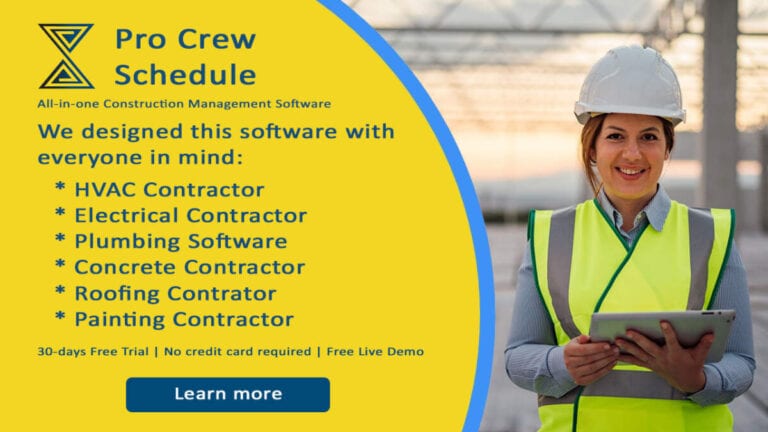When you keep track and ensure the company’s performance goals are met or exceeded, the project has more chances of being finished on time and within budget – defined as a success in the construction industry. These performance goals are directly linked to work output, time management, and decision-making. As a result, a project manager builds the crew’s dynamics by tracking progress and tasks to ensure the project is on track and running smoothly. Performance management plays a significant role in boosting your project’s productivity and profitability to reach these goals and do construction engineering in the most effective and organized way.
In today’s modern world, annual performance reviews are no longer necessary – instead, you must have an efficient performance management system in place. Regularly checking in with crew members, supervisors, and other employees helps the company be more engaged. Lucking managing employees is one improvement in construction management that has been made easier and more efficient by technology and software. Setting goals is integral to construction performance management, making workers more productive overall. In this article, let us dive into how to keep your performance rating high and soaring.
What Is Performance Management in Construction?
When it comes to the construction industry, performance management means creating a work environment where employees and subcontractors can do their best by taking responsibility for their tasks and completing them with superior quality and professionalism.
In a nutshell, performance management is a conversation you have with your employees. It is how you can tell your team about your expectations, how you will measure their key results areas, and how you will communicate and give feedback. It is a way of managing your team to ensure they stay on top of any problems that might arise on the job site or in the office. It is also a platform for you to know what your employees think and if they are happy and content with their workload and career. When such a process is implemented, employees are more loyal, work harder, and stay with the company for a long time.
How Does Your Company’s Performance Affect Your Profitability and Success?
Performance management is essential in the construction industry because it lets managers determine how employees contribute to the overall business strategy and project success. This lets you know which of your crew members are working and doing their jobs efficiently while also letting you know which ones may need a little assistance. You can quickly find and fix problems and keep employees motivated, engaged, and on schedule with performance management. This results in higher employee engagement and retention, increasing productivity and profits. It is a way for construction companies to show that it cares about their employees and clients, giving them an edge in the business.
The Five-Step Process to Managing Your Construction Crew’s Performance
In construction, the performance management process features five stages – setting expectations, checking in on the goals, reviewing and measuring how well those goals are being met, and compensating or rewarding employees who do well.
Plan and Set Expectations
This is the stage where you and your team set goals and expectations for the employee, project, division, and company. You can start by talking to your employees about the goals they want to set for how well they do their jobs.
It is essential to make sure the goals fit with what your company does best. You can define the core competencies, which are the things that make a company stand out from its competitors. This will help them set goals that will help them improve their behavior, technical skills, and leadership.
Check-In With Your Employees
Set regular one-on-one meetings with your employees to see how they are doing. This might seem simple, but the result has a significant impact. Employees who get feedback and personal attention regularly are more engaged and loyal to their company. You can help your employees stay on track during check-in or tell them they’re doing great.
Performance management can help increase employee retention and engagement. This is very important for construction companies that need to keep their current workers to compensate for the lack of workers. One-on-ones should be two-way streets where the manager asks for employee feedback.
Review And Evaluate Progress
Look at how your employees did in meeting the goals they set. Using software for construction management can help keep track of your construction workers during the review stage – making all the difference. When your company uses performance management software, managers can quickly look at evaluations and goals to determine who goes above and beyond at work or in the office.
Measure Key Performance Indicators (KPIs)
After goals are reviewed and evaluated, the next step is to see how well they were met. You can set numerical values or key performance indicators (KPIs) to track how your employees hit their goals while ensuring it is still aligned with the company’s big picture. Construction employee scheduling software allows managers can look at lists of tasks that have been finished, keep track of comments, and see when the tasks were finished. You can specify which crew members can take on new roles or get new certifications, and you can make a plan to fill any critical roles or skills gaps. When you look at your employees’ performance data, you can also give them an overall performance score.
Compensate and Reward Achievers
Once you have planned, tracked, reviewed, and measured performance, the last step is to decide if a reward or compensation is due. Most people will work harder if they think they will get something out of it, and many construction companies link pay raises and bonuses to how well employees do their jobs.

How Can You Improve Your Construction Company’s Performance?
A performance review is a process that sometimes goes smoothly and sometimes rough. Employees sometimes use it as constructive criticism to improve themselves, while others may take it to heart and feel unmotivated. This section lists some of the best practices in performance management to ensure your process increases productivity, keeps employees, and gets people interested.
Set Expectations using SMART Model
Using the SMART model to set goals is an excellent way for managers and employees to set goals together. Setting SMART goals is suitable for both short-term and long-term goals – it should be Specific, Measurable, Achievable, Results-Based, and Time-Bound.
Identify Your Key Players
Performance reviews are a great way to discover the key players in your construction business. Key players are employees who can move into new roles and help your business grow. An efficient performance management system will keep your workforce healthy. Take the time during your performance management process to give bonuses, raises, or even promotions to high-performing employees who have stood out.
Be Fair and Unbiased
Not every relationship between an employee and a manager is good – and not all coworkers get along. When deciding whether to promote or fire someone, be fair and unbiased by considering the employees’ work ethic and achievements.
Offer Constructive Criticism
As we have stated earlier, performance reviews have a bad reputation among employees and managers – it can go both ways; one employee is praised for his work, while the other gets terrible news or criticism. However, performance reviews should not be used to point fingers at employees – they should be an open conversation about their work and skills.
Use a Collaborative System
It is not practical or efficient to send many documents or tasks to other people through email. You can use project management software for the construction industry so everyone can access the same updated information at a glance. This boosts communication and collaboration between coworkers and the relationship between manager and employee. It is also easier for employees to see different tasks and check on how each is going.
Keep An Eye Out for Your Employees, Without Micromanaging Them
Even though you are far from your employees, you can still keep an eye on what they are doing. With software, you can find out how each task goes without micromanaging your employees. You can see which ones excel at a specific job and which are lagging and may need help.
Offer Skill Development and Training Seminars
Training is essential for new hires and people who have already been hired. A good construction team is one of the keys to a successful project, so make sure you give your employees room to grow. This also lets your employees feel like you care for their well-being and growth by honing their skills.
Create a Healthy and Safe Working Environment
No one can do well in a place that is always tense. People know that the construction industry is stressful, but the stress level can be lowered. Strive to create a healthy environment for your employees to focus on their goals. You can use construction time tracking software to see if your employees are working the proper hours or overloaded with work.
Celebrate Small Successes
Celebrate your company’s successes, no matter how small, to get your construction team excited and make the workplace more fun. Employees are likelier to do a good job when they feel appreciated. Celebrating small things will help your business as well.






